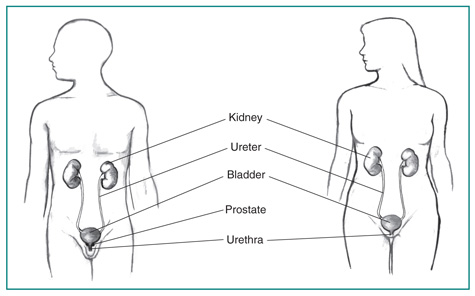Urinary Tract Infection
A urinary tract infection (UTI) occurs when bacteria get into your urinary system. Urinary tract infections usually begin in the bladder and urethra. If left untreated, they can spread to the ureters and kidneys.
Urinary Tract Infection Symptoms

UTIs can cause very uncomfortable symptoms including:
- Pressure or pain in your lower pelvis or abdomen
- Frequent or urgent need to urinate
- Need to urinate but only a small amount of urine comes out
- Foul-smelling urine
- Urine leakage
- Pain or burning when urinating
- Urine that looks cloudy or milky
- Blood in urine
- Penis discharge (in men)
Urinary Tract Infection Causes & Risk Factors
Your urinary tract can usually protect itself from infection, but certain factors increase your risk of developing a UTI.
- Being female. Women get more UTIs than men because bacteria and other infection-causing organisms (from the anus or vagina) can easily reach the urethra. Then they travel quickly to the bladder, which is only a short distance away. A man’s urethra runs to the end of his penis so bacteria have to travel further to reach the bladder.
- Menopause and post-menopause, which cause the lining of the urethra to get thinner as estrogen levels decrease.
- Diabetes and other chronic illnesses or medications that affect your immune system and make it harder for your body to fight infections.
- Conditions that make it difficult to completely empty your bladder, such as enlarged prostate and bladder and kidney stones.
- Long-term use of catheters
Urinary Tract Infection Testing & Diagnosis
Your provider may use a variety of tests to diagnose a urinary tract infection, including:
- Urinalysis
- Urine culture
- Cystoscopy of the bladder (a camera placed into the urethra for direct visualization) may be used to inspect the bladder.
- Kidney ultrasound
- Cat scan of kidneys, ureters, and bladder.
Urinary Tract Infection Treatment
Usually doctors prescribe antibiotics to treat UTIs. Once you start taking medication, your symptoms should go away in a few days, but this doesn’t mean you can stop taking the medicine. While you are on the mediation, drink plenty of water to help flush the bacteria out of your system.
To help ease the pain of a UTI, you can take an over-the-counter pain reliever and try putting a heating pad on your lower abdomen.
If you have recurrent UTIs (three or more in a year), your doctor may recommend additional treatments.
Urinary Tract Infection Prevention
You can reduce your risk of developing urinary tract infections with these steps.
- Drink plenty of water (enough that your urine is clear or a light yellow)
- Urinate when you first get the urge. Holding urine can increases bacteria growth in your bladder.
- Wipe from front to back after a bowel movement to avoid germs from the anus getting into the urethra
- After sex, urinate and drink a glass of water to help flush bacteria that may have been pushed into the urethra during intercourse
- Avoid genital cleansing products such as douches and deodorants. These remove your body’s natural protective secretions and oils
- Take showers instead of baths
- Wear cotton underwear
Frequently Asked Questions
Does drinking cranberry juice cure UTIs?
You can’t treat an active UTI by drinking cranberry juice, but substances in cranberries may help prevent UTIs by making it harder for bacteria to stick to the bladder wall. Keep in mind that fruit juices have a lot of sugar and consider cranberry pill instead.
How can I tell the difference between a urinary tract infection and a yeast infection?
Pay attention to when the burning or itching feeling occurs. A yeast infection causes vaginal itching or burning with a white discharge. In contrast, a urinary tract infection causes a burning sensation during or shortly after urination.
Quick Facts
Urinary Tract Infection Doctors
All Urology San Antonio Providers treat urinary tract infections.
